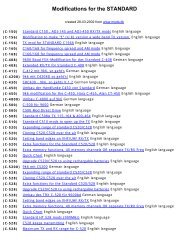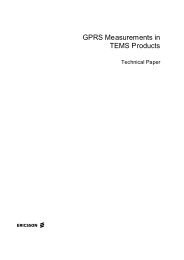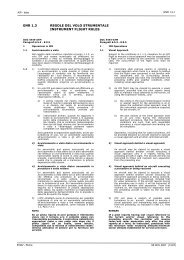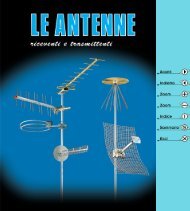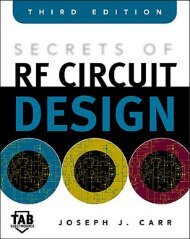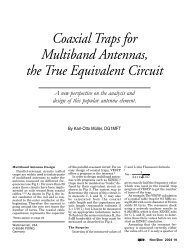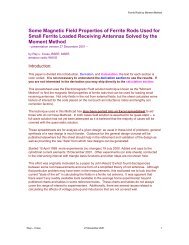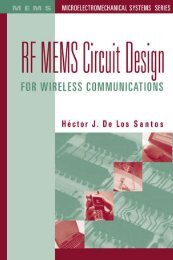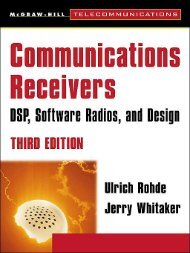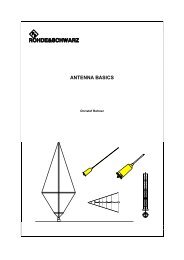- Page 2 and 3:
This page intentionally left blank
- Page 5 and 6:
R. F. Churchhouse Codes and ciphers
- Page 7 and 8:
Contents Preface ix 1 Introduction
- Page 9 and 10:
Cryptanalysisofalinearrecurrence 10
- Page 11 and 12:
Preface Virtually anyone who can re
- Page 13 and 14:
1 Introduction Some aspects of secu
- Page 15 and 16:
Not a very sophisticated method, pa
- Page 17 and 18:
change. As an example, anticipating
- Page 19 and 20:
Another form of encryption is the u
- Page 21 and 22:
and so is valid. On the other hand
- Page 23 and 24:
When the modulus is 10 only the num
- Page 25 and 26:
2 From Julius Caesar to simple subs
- Page 27 and 28:
Table 2.3 Shift Message 12 OUI 12 Y
- Page 29 and 30:
worry about but, on the other hand,
- Page 31 and 32:
then it is probably THE and the unk
- Page 33 and 34:
From Julius Caesar to simple substi
- Page 35 and 36:
From Julius Caesar to simple substi
- Page 37 and 38:
Table 2.6 From Julius Caesar to sim
- Page 39 and 40:
From Julius Caesar to simple substi
- Page 41 and 42:
and the key which provides the enci
- Page 43 and 44:
Further examination reveals that th
- Page 45 and 46:
ALTHOUGH I AM AN OLD MAN NIGHT IS G
- Page 47 and 48:
Polyalphabetic systems 35 messages
- Page 49 and 50:
Before leaving Vigenère try the fo
- Page 51 and 52:
Polyalphabetic systems 39 blocks of
- Page 53 and 54:
eginning at the top, but it is then
- Page 55 and 56:
first row above, for example, we fi
- Page 57 and 58:
Table 4.4 Key 3 1 5 2 4 1 2 3 4 5 6
- Page 59 and 60:
giving B G L D I N A F K E J O C H
- Page 61 and 62:
then the cipher text is HORUX SXSEO
- Page 63 and 64:
The plaintext digraphs are now sepa
- Page 65 and 66:
ox increases. By enumerating the po
- Page 67 and 68:
Example 5.1 HAPPY BIRTHDAY encipher
- Page 69 and 70:
Encryption The ‘plaintext’ is A
- Page 71 and 72:
plaintext digraphs according to som
- Page 73 and 74:
Cryptanalytic aspects of Playfair P
- Page 75 and 76:
OURXSITUATI ONXISXDESPE RATEXSENDXS
- Page 77 and 78:
the alphabet are represented by up
- Page 79 and 80:
From a cryptographic point of view
- Page 81 and 82:
3 7 0 7 7 4 1 5 6 1 7 8 5 3 8 1 9 0
- Page 83 and 84:
If we generate the same sequence (m
- Page 85 and 86:
Stencil ciphers The example above i
- Page 87 and 88:
Book ciphers A spy must avoid arous
- Page 89 and 90:
Table 7.2 Encipher table for a book
- Page 91 and 92:
Letter frequencies in book ciphers
- Page 93 and 94:
If then we try subtracting THE from
- Page 95 and 96:
where row F (the row of the cipher
- Page 97 and 98:
Ciphers for spies 85 that were nece
- Page 99 and 100:
mistake can occur if the sender lea
- Page 101 and 102:
inks and ciphers were provided by h
- Page 103 and 104:
Example 7.6 Encipher the message AG
- Page 105 and 106:
Ciphers for spies 93 simply a ‘ra
- Page 107 and 108:
going into the mathematical criteri
- Page 109 and 110:
numbers, 0 to 31 inclusive, into bi
- Page 111 and 112:
Linear recurrences The sequences lo
- Page 113 and 114:
Having converted the characters of
- Page 115 and 116:
What about sequences of higher orde
- Page 117 and 118:
combining the keys of two or more l
- Page 119 and 120:
Example 8.3 (1) Use the mid-square
- Page 121 and 122:
Problem 8.3 Starting with U 0 �1
- Page 123 and 124:
The Enigma cipher machine 111 syste
- Page 125 and 126:
The Enigma cipher machine 113 Plate
- Page 127 and 128:
The Enigma cipher machine 115 Plate
- Page 129 and 130:
Figure 9.2. wheel. For example, if
- Page 131 and 132:
wheel and then through the three wh
- Page 133 and 134:
first day of usage and so the asses
- Page 135 and 136:
The Enigma cipher machine 123 The m
- Page 137 and 138:
show how, in a typical encipherment
- Page 139 and 140:
interested reader can find it in [9
- Page 141 and 142:
great deal of data and many pages o
- Page 143 and 144:
It should be realised, of course, t
- Page 145 and 146:
10 The Hagelin cipher machine Histo
- Page 147 and 148:
ut there was no cryptographic advan
- Page 149 and 150:
of each cipher period, to which sid
- Page 151 and 152:
value can be expected to occur two
- Page 153 and 154:
Since some cages are obviously very
- Page 155 and 156:
2, there are 26! possible simple su
- Page 157 and 158:
The Hagelin cipher machine 145 Exam
- Page 159 and 160:
values are repeating at the appropr
- Page 161 and 162:
Overlapping will obviously affect t
- Page 163 and 164:
Table 10.6 The Hagelin cipher machi
- Page 165 and 166:
11 Beyond the Enigma The SZ42: a pr
- Page 167 and 168:
Description of the SZ42 machine The
- Page 169 and 170:
P1 41 43 Z1 (4) the five bits from
- Page 171 and 172: which is approximately 1.6�10 19
- Page 173 and 174: 12 Public key cryptography Historic
- Page 175 and 176: part of the story of what has been
- Page 177 and 178: Public key cryptography 165 graphic
- Page 179 and 180: (4) Now (k x ) y �(k y ) x �m x
- Page 181 and 182: Public key cryptography 169 Despite
- Page 183 and 184: If the cryptographer were prepared
- Page 185 and 186: number of tests increased by a fact
- Page 187 and 188: In this case the remainder is 4, no
- Page 189 and 190: key, d, we use the Euclidean Algori
- Page 191 and 192: the decipher key, d, is used instea
- Page 193 and 194: and and, since Table 13.1 n N�2 n
- Page 195 and 196: The Data Encryption Standard (DES)
- Page 197 and 198: the message were known to relate to
- Page 199 and 200: whereas in block cipher systems, su
- Page 201 and 202: (1) X precedes M with information w
- Page 203 and 204: ways, since choosing to pair, say,
- Page 205 and 206: For example; if someone claims that
- Page 207 and 208: depth, mentioned in Chapter 3. If w
- Page 209 and 210: M9 Combining two biased streams of
- Page 211 and 212: and so 2�4�6�12 �(4095)�4
- Page 213 and 214: Verification Let the recurrence be
- Page 215 and 216: the lettersatsetting2ofthewheel,and
- Page 217 and 218: M16 Probability of a ‘depth’ in
- Page 219 and 220: (2) In how many ways can N be repre
- Page 221: Chapter 13 M21 (Rate of increase of
- Page 225 and 226: If x 3 �0 divide x 2 by x 3 to gi
- Page 227 and 228: then k�[ log 2 n], where [z] deno
- Page 229 and 230: Mathematical aspects 217 problem un
- Page 231 and 232: RHAPSODY and SYMPHONY agree in posi
- Page 233 and 234: 4.2 (Number of possible transpositi
- Page 235 and 236: Table S.5 R H A P S O D Y B C E F G
- Page 237 and 238: Chapter 8 8.1 (Recurrences of order
- Page 239 and 240: columns in each case, are full of c
- Page 241 and 242: Chapter 11 11.1 (Pin-setting errors
- Page 243 and 244: [2.4] Moroney, M.J.: Facts from Fig
- Page 245 and 246: [10.3] Almost any elementary book o
- Page 247 and 248: Name index Adelman, L. 171, 234 And
- Page 249 and 250: Subject index Abwehr Enigma 124, 13
- Page 251 and 252: active pin 136 cage:‘good’ 141;




